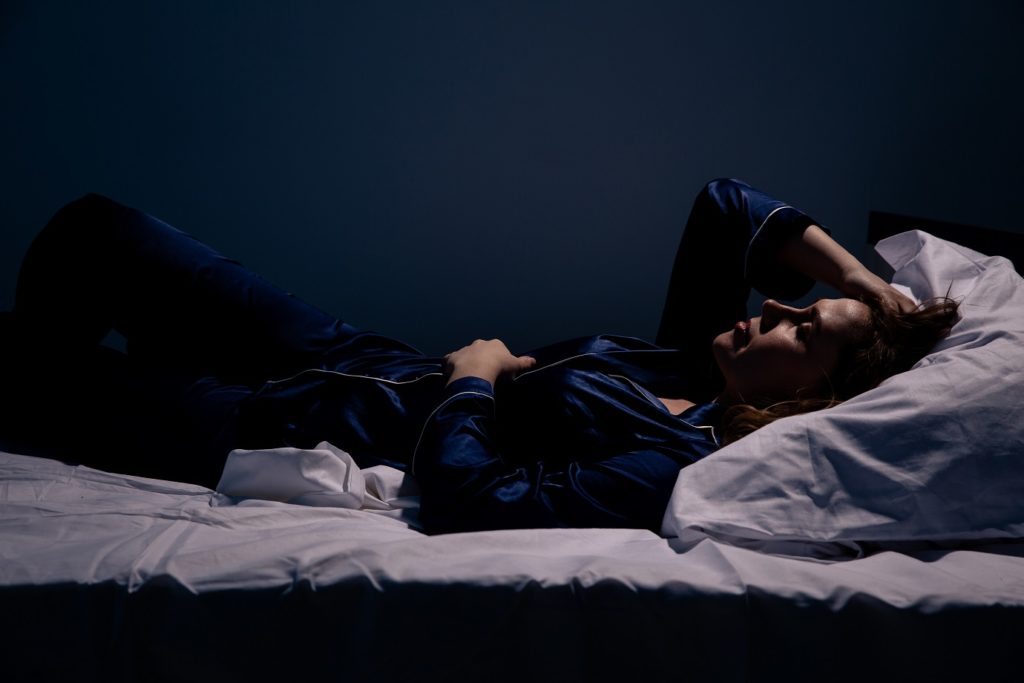If you’re having sleep issues, your monthly cycle could be to blame. According to a National Sleep Foundation poll, 33% of respondents said their sleep was disturbed during their menstrual cycle, and in another survey, 7 in 10 reported sleep changes just before their period. For those with existing sleep issues, there’s also evidence that symptoms are worse at certain stages of the cycle.
Some common sleep issues that people experience include:
- finding it harder to get to sleep and stay asleep
- having restless sleep
- feeling sleepier during the day
- strange and vivid dreams or nightmares
Lack of sleep can increase sensitivity to aches and pains, reduce the ability to regulate emotions, manage stress and communicate effectively, and affect our cognitive function and alertness. Lack of sleep can also lead to junk food cravings and being less likely to exercise. If you think these symptoms sound familiar, you’re right – a lot of these symptoms are part of what many individuals experience as “premenstrual syndrome” (PMS), even if they’re not sleep deprived! That’s why prioritising sleep, especially at certain parts of your cycle, is so important.
Let’s look at how your monthly cycle can influence your sleep, and what you can do to alleviate issues.
Rising and falling hormones
During the menstrual cycle, which is typically about four weeks, three key hormones – oestrogen, testosterone and progesterone – rise and fall according to a specific pattern. The extent to which your sleep is impacted depends on how much these hormones fluctuate and how sensitive you are to these fluctuations, but also depends on your health behaviours.
- Week 1: For the first week (while you are menstruating) oestrogen rises as the follicular phase starts, which can be a mood-booster. This is usually a good week for sleep, but menstrual cramps, particularly in the first few days of menstruation, can make it difficult to sleep for some people.
- Week 2: Oestrogen as well as testosterone continue to rise during the second week, culminating in ovulation. These hormonal surges can make you feel more alert, confident and boost your libido – but can also cause anxiety and extra stress due to excessive arousal in the brain. If you can minimise anxiety and stress, you’re likely to have a restorative sleep this week.
- Week 3: During the third week, it’s progesterone’s turn to rise while other hormones like oestrogen drop as the luteal stage begins. This can cause irritability, fatigue and fogginess as well as difficulties sleeping. But, as oestrogen rises again at the end of the week, you’ll probably find it easier to get a good night’s sleep. Hormonal changes can also affect how vividly and how often we dream. The luteal phase (starting in Week 3 and going till the end of Week 4) may be associated with more pleasant dreams, but also very vivid dreams and even nightmares that result in sleep disturbance.
- Week 4: In the fourth week oestrogen is on the way back down again, and this time it can really drag down your mood and cause PMS- this is typically the worst week for sleep disorders. Those who experience PMS may struggle even more – insomnia before and during a period is at least twice as likely with PMS. PMS can also result in altered sleep architecture – an abnormal sleep cycle. This can result in a vicious cycle as poor sleep in turn exacerbates many premenstrual symptoms such as mood swings.
How to manage fluctuations
It’s a good idea to track your cycle even if you’re not trying to fall pregnant. There are lots of apps that make this easy and enable you to keep a record of your symptoms too. Simply being aware of menstrual cycle phases and how these affect your mood and sleep can help you to take better care of yourself across your cycle. For example, if you know you’ve got a more challenging week coming (say in Week 3 or 4), you can plan for extra downtime, cut yourself a tiny bit of slack at work if you can, and prioritise rest and sleep. Then in the weeks where you’re more alert and extroverted, you can focus on more complex tasks at work and do more socialising. If you have a partner, it’s a good idea to share your knowledge about your cycle with them as well so they can better support you.
Focusing on healthy sleep hygiene is also vital, by optimising your night-time routine and sleeping environment. Turn screens off half an hour before bed, avoid caffeine, alcohol and big meals too close to bedtime, and try relaxation techniques such as mindfulness meditation. Regular exercise is also important for improving sleep and alleviating PMS.
Sleep can get disrupted even with a normal, healthy cycle. But there are many other hormonal factors, such as having PCOS (polycystic ovarian syndrome), being on contraceptives, or menopause that come into play as well. These can also affect sleep differently, as can the medications used to treat hormonal conditions.
Quite often, finding ways to reduce PMS will also help your sleep. It’s important to remind yourself that sometimes poor sleep is just due to your menstrual cycle, and it will get better over the next few days! This can help to alleviate some of the stress and anxiety about not getting a perfect sleep every night.
If you think that your PMS or sleep issues are having an impact on your quality of life, try keeping a diary of your sleep and premenstrual symptoms, and bring this along to a GP.

